More than 100 years since his death, Philippine national hero Jose Rizal continues to inspire his countrymen around the world, including his Filipino-Australian descendants who watched the play ‘Her Son, Jose Rizal’ and went home with a renewed sense of their ancestor’s noble legacy.
MICHELLE BALTAZAR writes.
University student Jared Reyes, a Filipino-Australian living in Sydney, recalls writing his Year 10 report on Philippine national hero, Jose Rizal. None of his schoolmates knew who Rizal was but Jared thought it was important they were at least made aware of him.
He wanted to share the story of one of the greatest Filipinos who ever lived – but is unknown on Australian soil.
What his schoolmates didn’t know was the report meant more than he let on: Jose Rizal was his great great granduncle.
The family linkage comes by way of Rizal’s eldest sister, Saturnina, whose great grandson is Jared’s father, Enrique Reyes.
Enrique married Helen Anne Philips, who is of English, Welsh and Scottish descent, and the couple moved to Australia in 1985 where they raised their three children: Isaac, Adele and Jared.
The past collided with the present when all five attended the June 19 gala of the play ‘Her Son, Jose Rizal’ at the Tom Mann Theatre in Sydney. Those who were seated near row M, seats number 8 to 15, didn’t know it but they were watching the play right next to the living, breathing relatives of Rizal.
Jared said being among the audience at the play inspired him to find out more about his heritage.
“I’m fairly disconnected from my Filipino culture especially living in Australia, from a small country town where we’re the only Asian family,” he said.
“But coming here and seeing a packed-out theatre of Filipinos … there’s no excuse for me not to get involved.”
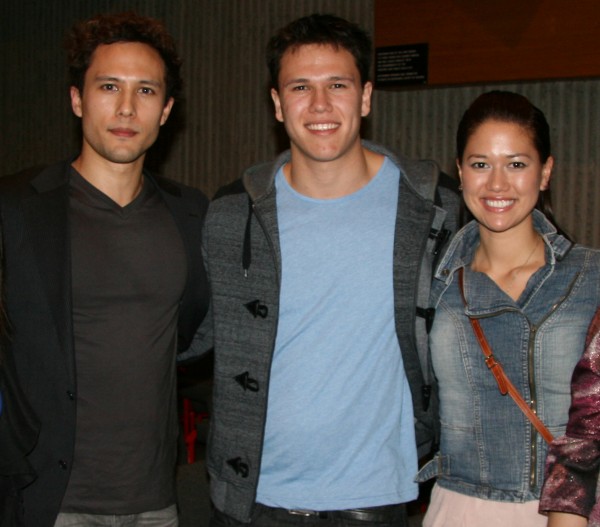
Left to right: Isaac Reyes, Jared Reyes and Adele Reyes at the play.
Left to right: Isaac Reyes, Jared Reyes and Adele Reyes at the play.
His sister Adele thought the play was “epic and very dynamic” and admired the camaraderie among the cast.
“We could feel the bond between the cast members and it was just something that really made me feel proud of my heritage and of my family,” she said.
Like Jared, the play made Adele reflect on her family roots. “As I watch the play, I was thinking about how I felt a little removed from the history and my culture in the Philippines.”
A trip back ‘home’ two months ago revived her interest and she’s also started re-reading Rizal’s works in Spanish, having learnt the language last year.
“I am recognising his true genius as a writer, discovering more of his wit and humour, which perhaps was lost a little in the translations.”
While she has read Rizal’s novels ‘Noli me Tangere’ and ‘El Filibusterismo’, her favourite is Rizal’s letter to the women of Malolos, written to a group of Filipina women who in 1888 defied the local authorities when they pushed for more education.
That strong and independent women had a central role in Rizal’s life was evident in the play, which revolved around the strong bond between Rizal and two of the women closest to him; his mother, Teodora Alonzo and his younger sister, Soledad.
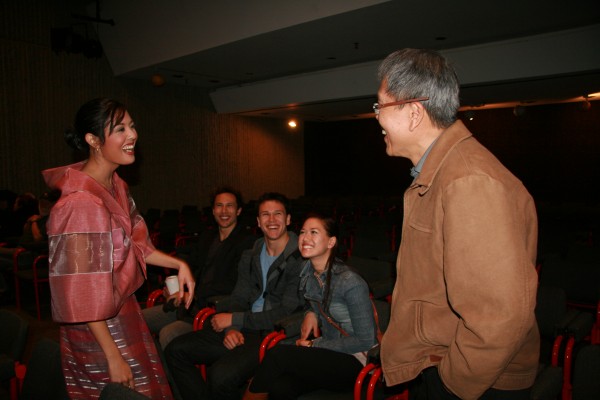
From L-R: Ala Paredes, Isaac Reyes, Jared Reyes, Adele Reyes and Enrique Reyes.
Isaac, the eldest of the Reyes children, thought one of the most touching moments in the play was the scene that captured those familial ties the most – the scene where Rizal asked his mother’s blessing to stand his ground, even if it costs him his life.
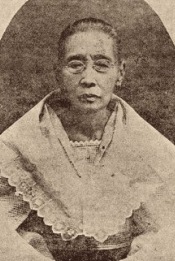
Teodora Alonzo, mother of Jose Rizal.
“He is saying he’s willing to die for his country. Now for a mother, that’s hard. She’s got her nationalistic ideals on one hand but then she’s got that motherly instinct on the other hand, and she’s trying to reconcile these two things. I think that played out really well onstage,” said Isaac.
To their dad, Enrique, it was a special moment to bring his family together in one room to re-acquaint themselves with their noble lineage.
He was particularly moved by the scene where Soledad gave Rizal a diamond ring that came with special instructions. “She mentioned that it came from Saturnina, my great grandmother. That was quite touching.”
Modern day revolutionaries
Their mother Helen said the play was a revelation in many ways. Leaving the theatre, they passed by a monument of Jose Rizal right next to Central Station, an experience that only strengthened her children’s resolve to learn more about Rizal.
“We have always taught our children to ‘remember who they are’. Hopefully, this has taken on new meaning for them.”
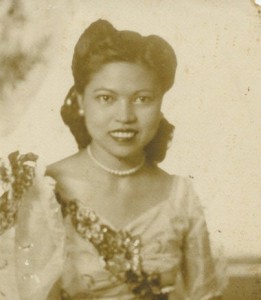
Emma Ver Reyes, Enrique's mom. Photo from Reyes family album.
Adele has certainly shown the gene connection, working three jobs for several months just so she can save enough money to do missionary work in Arizona. For 19 months, Adele joined the Arizona Phoenix Spanish Speaking Mission, helping the local Hispanic community. “I wanted to experience a life devoted to serving others,” she said.
But like Rizal, would she and her brothers die for their country?
“That’s a tough question … after seeing this play, and of knowing of my roots, I would like to say yes, I would die for my country – and proudly,” said Adele.
She added that it’s not so much about dying for a country but standing up for what is right. Isaac and Jared agree.
“A country is the product of the policies and the socialisation that is present in that country at that moment. So would I die for a country that is sending its troops into war for stupid reasons? No. Would I die for a country that would stand for the ideals of Jose Rizal? Yes, I would,” said Isaac.
He laments, however, that Rizal’s legacy is lost to some Filipinos.
“I have observed with disturbing frequency fellow Filipinos who, when quizzed about their background, make attempts to dilute their Filipino ancestry,” he said, explaining they would do this by playing up their Spanish or Chinese ancestry (or both) and playing down their Filipino ancestry.
“At the end of the day, the Philippines is a melting pot of various cultures and races. I would like to see more people responding with ‘I am a Filipino’ with head held high.”
“Tito Jose was proud of his heritage and this is something I would like to see more of, particularly in Filipino-Australians.”
Judging by Isaac, Adele and Jared’s sentiments, Rizal’s sense of national pride lives on, more than 100 years later.
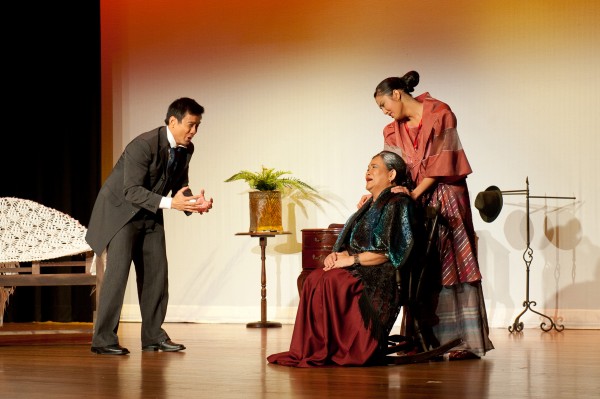
A scene from the play. Photo by Craig Peihopa
To their dad, Rizal’s heroism manifests itself in various forms today.
He said if he was asked the same question about dying for his country, his honest and immediate answer would be “no”.
“But I would like to add my sentiment that there are thousands of Filipino migrants quietly battling to raise and educate their children to the best of their ability here in Australia,” he said.
These Filipinos and their children, more than 1.2 million in Australia according to the latest census, make a decent living and have successfully adapted to their host country.
“All of them are unsung, albeit modest, heroes of our time. Rizal would be proud of them.”
Note from Enrique Reyes, great-grandnephew of Jose Rizal, on the play
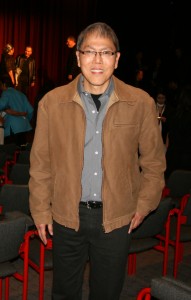
Enrique Reyes at the gala performance
“I knew it was going to be a special day – a gala night show about Rizal on his birth anniversary. I knew I had to organise the whole family and a few friends to be there. And yes, it turned out to be very special.”
“Helen and I were pleasantly surprised to be upgraded to nearly front row seats from way back. There we could feel and almost touch the energy and the enthusiasm of the cast, it was electric. The costumes were good and the singing was excellent. I wished then that there was a bit more singing, but then it would detract from the heroic theme the one-act play had. It was perfect.”